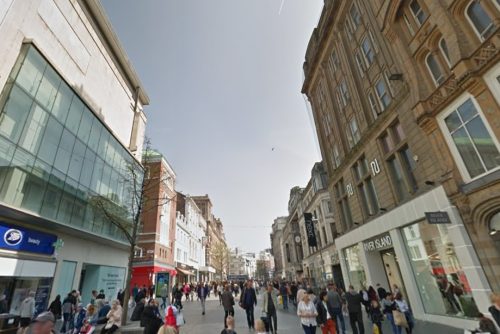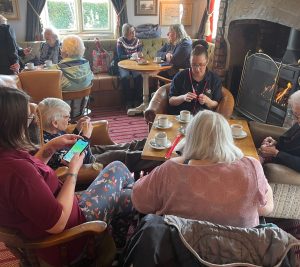North West business briefs: Liverpool BID Company; Liverpool One; UKCM; EY-Parthenon; Redrow; Joseph Holt

Liverpool BID Company is calling for the reinstatement of tax-free shopping and its extension to EU visitors, which it said could bring a 10% boost to the local economy.
Retail and high-spending tourists are a vital ingredient in Liverpool’s economy – £2.1bn is spent each quarter in Liverpool City Region’s economy covering retail, hospitality, food, drink and other services. This reaches £734m in the city centre in post-COVID recovery. Retail and high street spend in Liverpool traditionally outperforms the national average. This adds to the wider buoyancy of the city’s economy, its vacancy rate is around five per cent, almost half that of the national average and shows the demand the city centre’s high streets still have for investors, small businesses and international brands.
With an international airport welcoming flights from more than 150 destinations worldwide, two Premier League football clubs and a vibrant music and cultural scene, Liverpool also has a strong travel and tourism sector. It is worth £3.5bn, with hotel occupancy reaching 1.98 million visitors (2021). The visitor economy in Liverpool employs 58,000 people.
The re-introduction of tax-free shopping would provide a much needed boost to the city centre economy translating to valuable jobs, and economic self-sufficiency. It would increase footfall in key destinations within the city centre, boosting the city’s visitor economy and tourism spend.
The BID Company said tax-free schemes boost retail spending by tourists. This increase in consumer spending would increase the city’s GDP and stimulate job creation. Not only would this impact retail and hospitality, but the ripple effect along the supply chain to the wider city region and beyond would have a positive impact throughout the North West. Predicted benefits for the regions is £5bn annually, half of the total additional spending.
The BID Company represents the interests of 800+ levy-paying businesses in Liverpool city centre, spread across three business improvement districts covering much of the geography of the city centre: The Retail & Leisure BID stretches from Hope Street and the historic Georgian Quarter through to the city’s retail heart and Lime Street Station; the Culture & Commerce BID spreads from the famous waterfront up to the St George’s Quarter; while the Accommodation BID represents the interests of the city’s hotels and serviced economy.
::

Located on Paradise Street, the Luxe Collective activation challenged members of the public to distinguish a real designer handbag from a counterfeit one, offering one discerning participant the chance to win an authentic Louis Vuitton Neverfull MM tote bag.
Co-founded by brothers Joe and Ben Gallagher in Liverpool in 2018, Luxe Collective has become one of the UK’s fastest growing names in the pre-loved luxury sector, and recently secured investment through BBC’s Dragon’s Den. Through carefully curated social media content and a meticulous authentication process, the brand allows consumers to buy and sell items directly to Luxe Collective and offers pre-loved designer apparel, including bags, accessories, and footwear.
Rob Deacon, Asset Management Director at Liverpool One, said: “Championing best-in-class local and online brands is one of our key commitments at Liverpool One and it was brilliant to see the response to Luxe Collective’s activation last weekend.”
Ben Gallagher, co-founder and Head of Social Media at Luxe Collective Fashion, said: “Showcasing Luxe Collective at our Real vs. Fake event in Liverpool One last weekend was a huge leap forward in our brand journey. It was great to meet our followers face to face, share stories and get to know our community better.”
::

The Winsford-based firm has invested in a duo of state-of-the-art DAF trucks, introducing the first of the new fleet design since UKCM joined the Impact Environmental Group (IEG). The re-energised livery, which incorporates the branding of the wider group and its UK-based companies, was designed by UKCM’s Finance and Operations Director Liz Wolstenholme, who is also the CPC holder for the firm’s operator’s license, and Liz Roth, Global Director of Marketing & Brand Integration at IEG.
The high-specification DAF XG480 vehicles have been supplied by Rowleys of Northwich. They boast air management for ultimate aerodynamics, an air-suspended driver’s seat, and a luxurious XG new generation high roof sleeper cab, amongst other amenities.
Liz Wolstenholme said: “This recent substantial investment, introducing to the business more enhanced and efficient vehicles, represents a significant move for UKCM as we embark upon the next chapter as part of the IEG group. The new additions, with their fresh look and nationwide distribution, will strongly cement our brand presence and wider offering across the length and breadth of the country.”
Liz Roth said: “These state-of-the-art vehicles represent cutting-edge transportation technology and mark a significant milestone in introducing IEG’s family of brands together. With our updated branding, each vehicle stands as a testament to our commitment to excellence and our vision for a future where quality and sustainability go hand in hand.”
::

Sam Woodward
A total of 27 profit warnings were issued by UK-listed companies in the North West in 2023, down by more than 20% from 34 in 2022, according to EY-Parthenon’s latest Profit Warnings report.
Despite the overall decrease in 2023, seven profit warnings were issued in the region during Q4, up from the five issued in Q4 2022. Warnings in the region were also up quarter-on-quarter compared with the six issued in Q3 2023, marking a challenging end to last year for listed businesses in the North West.
Companies operating in consumer discretionary FTSE sectors in the North West issued the region’s highest volume of warnings across 2023 with a total of eight warnings, while industrial and technology companies in the region issued the joint-second highest volumes of warnings, with five each.
Sam Woodward, EY-Parthenon UK&I Turnaround and Restructuring Partner in the North West, said: “Companies in the North West displayed resilience in 2023, so it was positive to see a year-on-year fall in total profit warnings in the region. However, the challenges facing the economy certainly haven’t subsided, particularly the lagged effect of high interest rates which was highlighted by the region’s uptick in warnings in Q4 2023.”
Jo Robinson, EY-Parthenon Partner and UK&I Turnaround and Restructuring Strategy Leader, said: “In 2024, businesses will hope for a quicker-than-expected fall in inflation and interest rates, but many moving parts need to slot into place before we can be sure of an economic ‘soft landing’. We expect to see increasing disparity between businesses that are positioned to capitalise on still limited growth and those that are hampered by the impact of recent earnings pressures or their access to and the cost of capital. It is shaping up to be an easier year for many, but not all UK companies.”
::

The survey of 1,000 young adults found that it’s not just the potential high salary young women find appealing (39%), but also the opportunity to have a long term career (26%) and the ability to set up their own business later down the line (25%). The increase in women entering the sector could be attributed to a rise in female role models. In fact, more than two fifths (42%) of women surveyed want to work for a company that has female or LGBTQ leaders.
With financial fears a big worry for everyone, two in five (41%) 16-24-year-olds associate an apprenticeship with earning money while studying and not incurring student debt, highlighting the unbeatable financial benefit of this alternative educational route. Despite young people embracing the apprenticeship route, there remains a stark gap in the advice given by both schools and parents to young people when it comes to choosing their next education move.
Three in five (60%) of those surveyed admit going to university is, or was, more encouraged at their school, with 48% feeling there’s a general stigma associated with being an apprentice rather than pursuing higher education. More than 42% of those surveyed also say that their parents don’t know much about apprenticeships and disagree that there is equal focus on apprenticeships and other routes vs university (35%).
Karen Jones, HR Director for Redrow, said: “With such positive opportunities from this career choice, it’s no wonder that in this societal climate, women are bravely challenging the norm and exploring new industries altogether. The construction industry is such an exciting one to be in and there needs to be more women coming into the industry.”
::

Knitting club
Manchester family brewery, Joseph Holt, is launching `Feb-BREW-ary`, a month-long campaign to raise awareness of the role its pubs play in tackling loneliness and bringing people together, not only as a places to enjoy a drink and something to eat, but also as a hive of community and voluntary activity through a wide range of social clubs and support groups.
The 175-year-old brewery operates pubs across the North West and is known for producing award winning ales. But aside from brewing beer, there`s another brew, the faithful cuppa, which is central to the many community amenities which take place at Joseph Holt pubs, and which are such an important source of support and wellbeing, ranging from bereavement sessions to Alzheimer’s and menopause support groups as well as knitting groups, chit-chat groups and even church services.
Marketing manager, Paul Longmire, said: “As an independent business which has been in the same family for six generations, Joseph Holt has always believed strongly that pubs create a sense of togetherness. Our pub managers are constantly looking at ways to bring people together, fight loneliness and provide warm, lively, and uplifting places to meet. So, although we are known for the award-winning ales we brew, the idea of coming in to have a different type of brew is vitally important, too. That`s how we came to launch Feb-BREW-ary.”
Social groups run by Joseph Holt pubs include: Chatterbox mornings at the Millhouse in Warrington. Held every other Tuesday morning, over a free cuppa and biscuits, there are discussion sessions and guest speakers; Keep fit, and walking groups at the New Grove Inn in Whitefield. The pub is also the venue for a recipe club; The Crown hosts drop-in ‘Chill and Chat’ sessions every Wednesday with free tea/coffee/cakes and biscuits; A bereavement group that meets over a cuppa and cakes at the Lychgate in Wigan on the first Tuesday of every month; The Doffcocker in Bolton has both a railway club and a walking club; There are weekly church services at the Mosely Arms in Bolton; The Hayfield in Ormskirk hosts a weekly ‘knit and natter’ group and is soon launching a parent and baby group; The Blue Bell in Bury runs a weekly chit chat group.
Chief executive, Richard Kershaw, said the company is constantly looking for places where there is a ‘gap’ in the geography of its estate: “Joseph Holt is a family business and as such we are so aware of our history and of the role we play in the communities where we operate, which is why location is so important to us.”







